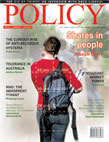 The Centre for Independent Studies (CIS) was established in 1976 by Greg Lindsay (pictured). Lindsay still heads CIS today. It was modelled on the UK Institute of Economic Affairs (IEA). Lindsay was encouraged in this by various business leaders.
The Centre for Independent Studies (CIS) was established in 1976 by Greg Lindsay (pictured). Lindsay still heads CIS today. It was modelled on the UK Institute of Economic Affairs (IEA). Lindsay was encouraged in this by various business leaders.
 In 1979 when CIS was still a part-time hobby of Lindsay's, Lindsay approached Hugh Morgan (pictured), CEO of Western Mining Corporation (now WMC), one of the world’s largest mining companies, for support. Morgan, whose father had been managing director of Western Mining before him, was described in the Sydney Morning Herald in 1985 as ‘the most important conservative figure in Australia. He is not merely an outspoken captain of industry, he is at the centre of a large and growing network of activists who are seeking to reshape the political agenda in this country.’
In 1979 when CIS was still a part-time hobby of Lindsay's, Lindsay approached Hugh Morgan (pictured), CEO of Western Mining Corporation (now WMC), one of the world’s largest mining companies, for support. Morgan, whose father had been managing director of Western Mining before him, was described in the Sydney Morning Herald in 1985 as ‘the most important conservative figure in Australia. He is not merely an outspoken captain of industry, he is at the centre of a large and growing network of activists who are seeking to reshape the political agenda in this country.’
Morgan was a major supporter of market-oriented think tanks. He identified four targets that he and his networks were concentrating on: the education system, the growth of the public sector, the power of trade unions and the arbitration system. He was also critical of sectors of the church establishment for focussing on wealth distribution rather than wealth creation. Morgan, became head of the Business Council of Australia after he retired from WMC.
Following the approach from Lindsay, Morgan rang around his business colleagues and got a funding commitment of $40,000 per year for the following five years for CIS from WMC, CRA, BHP, Shell, Santos, and The Advertiser. This enabled Lindsay to become its full-time director and CIS to have an office in St Leonards.
In 2005 its board included businessman Robert Champion de Crespigny and National Australia Bank chairman Michael Chaney. Its donors have included donations from McDonald's Australia, BHP Billiton, Shell, Western Mining Corporation, ICI, Philip Morris, Pratt Foundation, Dame Elisabeth Murdoch and Fairfax.
 Today CIS has offices in Sydney and Wellington, NZ. In 2005 it had an income of around $2.5 million and a staff of 23. It runs seminars workshops and conferences, publishes books and monographs as well as a journal titled Policy. It runs free weekend seminars for students. It gets two thirds of its funding from foundations and businesses.
Today CIS has offices in Sydney and Wellington, NZ. In 2005 it had an income of around $2.5 million and a staff of 23. It runs seminars workshops and conferences, publishes books and monographs as well as a journal titled Policy. It runs free weekend seminars for students. It gets two thirds of its funding from foundations and businesses.
The CIS is committed to ‘an economy based on free and competitive markets’ and property rights. It claims government decision-making should be turned over to the market and that the market and its automatic pricing mechanism should be used to allocate resources. It has strong links with the Washington-based Cato Institute.
CIS deals with ‘practical public policy issues’ as well as ‘more intellectual issues focussing on the way societies work and the importance of liberty in securing prosperity both economically and socially.’ It publishes the work of various conservatives including media baron Rupert Murdoch; economists such as Hayek and Milton Friedman; conservative US law professor and ‘takings’ expert, Richard Epstein; Nick Greiner, a former premier of NSW, and various think tank scholars from the US and the UK. ‘We are the retailers and wholesalers of ideas’ says Lindsay.